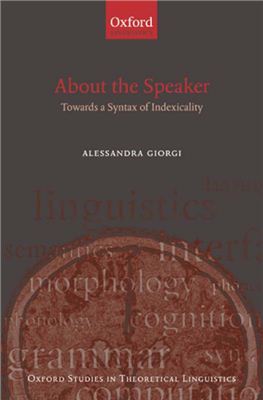Oxford Studies in Theoretical Linguistics
Pages: 243
Publisher: Oxford University Press (2010)
Quality: good: pdf
This book considers the semantic and syntactic nature of indexicals - linguistic expressions, as in I, you, this, that, yesterday, tomorrow, whose reference shifts from utterance to utterance.There is a long-standing controversy as to whether the semantic reference point is already present as syntactic material or whether it is introduced post-syntactically by semantic rules of interpretation. Alessandra Giorgi resolves this controversy through an empirically grounded exploration of temporal indexicality, arguing that the speaker's temporal location is specified in the syntactic structure. She supports her analysis with theoretical and empirical arguments based on data from English, Italian, Chinese, and Romanian. Professor Giorgi addresses some difficult and longstanding issues in the analysis of temporal phenomena - including the Italian imperfect indicative, the properties of the so-called future-in-the-past, and the properties of Free Indirect Discourse - and shows that her framework can account elegantly for all of them. Carefully argued, succinct, and clearly written her book will appeal widely to semanticists in linguistics and philosophy from graduate level upwards and to linguists interested in the syntax-semantics interface.
ISBN 978–0–19–957189–5 (Hbk.)
ISBN 978–0–19–957190–1 (Pbk.)
Pages: 243
Publisher: Oxford University Press (2010)
Quality: good: pdf
This book considers the semantic and syntactic nature of indexicals - linguistic expressions, as in I, you, this, that, yesterday, tomorrow, whose reference shifts from utterance to utterance.There is a long-standing controversy as to whether the semantic reference point is already present as syntactic material or whether it is introduced post-syntactically by semantic rules of interpretation. Alessandra Giorgi resolves this controversy through an empirically grounded exploration of temporal indexicality, arguing that the speaker's temporal location is specified in the syntactic structure. She supports her analysis with theoretical and empirical arguments based on data from English, Italian, Chinese, and Romanian. Professor Giorgi addresses some difficult and longstanding issues in the analysis of temporal phenomena - including the Italian imperfect indicative, the properties of the so-called future-in-the-past, and the properties of Free Indirect Discourse - and shows that her framework can account elegantly for all of them. Carefully argued, succinct, and clearly written her book will appeal widely to semanticists in linguistics and philosophy from graduate level upwards and to linguists interested in the syntax-semantics interface.
ISBN 978–0–19–957189–5 (Hbk.)
ISBN 978–0–19–957190–1 (Pbk.)

